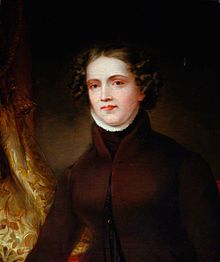 |
| Anne Lister, Regency Lesbian |
I
finally managed to watch The Secret
Diaries of Miss Anne Lister, a BBC production from 2010 that tells the
story of Anne Lister, an upper-class Englishwoman who defied the conventions of
her time to live and love as she wanted to.
Lister,
for those of you unfamiliar with her story, lived in Halifax, in Northern
England, from 1791-1840. And although her life overlaps quite a bit with that
of Jane Austen, her life story and her diary reveal quite a different world
than the one Austen recreates in her novels. Lister kept a secret diary, much
of which was written in code, and the coded bits are, naturally, the juicy
bits. In her copious diary, Lister details her love affairs with various women,
as well as her interest in women and her disinterest in men.
Her
diaries number 4 million words and naturally touch on many other subjects, but
for historians of sexuality, her diary is most important for the way that
Lister writes about her same-sex desires and her sexual identity. The “no
homosexuals before 1900 rule” that many post-Foucaultian scholars considered to
be (used to consider?) a hard and fast assumption seems ridiculous when we
consider Lister. She clearly thought of herself as “a woman whose primary
romantic and sexual attraction is to other women.”
| Maxine Peake, left, as Lister, & Anna Madeley as Mariana Belcombe. |
The
BBC production, however, was a disappointment. While Maxine Peake, who played
Lister, seemed up to the part, she was miscast. She looks absolutely nothing
like the portraits of Lister, with her bouncing red curls instead of Lister’s
dark brown locks, and the script and story focused on portraying Lister as
romantic, desperate, and hysterical. The time line of her life was truncated
and mangled in the film, and there was no discernible story arc.
The
basic narrative focuses on Lister’s problematic affair with real-life lover
Marianna Belcombe (later Lawton) and Lister’s later successful relationship
with wealthy heiress Ann Walker. The film also represents some of the other
aspects of Lister’s life: her scholarly interests, the changes she made to her
home, Shibden Hall, and her interests in engineering and coal-mining. The film
also represents some of the negative reactions Lister faced to her increasingly
masculine appearance and clothing and the suspicion surrounding her and her
female “friends.” Some people in the area who knew of her odd ways called her “Gentleman
Jack”—and not in a nice way.
Lister’s
life could indeed make a wonderful, exciting, and thought-provoking film, but
this one just wasn’t it. Far more interesting was the mini-documentary included
in the special features on our disc, called “The Real Anne Lister” with Sue
Perkins. The documentary includes interviews with various scholars who study
Lister and Regency England, including Helena Whitbread who is the main editor
of Lister’s diaries.
“The
Real Anne Lister” takes us into Shibden Hall as it looks today and to the
boarding school where Anne was sent as a teen—and where she had her first love
affair with another girl. In between interviews with scholars and historians,
Sue Perkins walks us through Lister’s life and loves, giving us a far more complete
picture of Lister as a woman interested in intellectual pursuits, one who
actively pursued other women at a time when such relationships were
stigmatized, and one who had many other interests as well, including
mountaineering, something the fictionalized film does not include.
Perkins
presents Lister as a problematic figure, one who, as contemporary lesbians, we
can admire for her boldness and her decision not to live in the closet, but who is also deeply troubling and
perhaps even unlikable. Perkins notes in the documentary that Lister seems
heartless at times, forgetting her lover from her school years, Eliza Raine
(who died young after being sent to an insane asylum), and seducing other women
thoughtlessly, selfishly. Perkins also faults Lister for being class conscious
in her pursuit of other women, focusing mostly on women of the upper middle
class and upper class—women like Lister herself.
| A later portrait of Lister reveals the "mannish" quality that eventually caused her lover, Mariana, to leave her. |
But
we don’t have to like Lister in order
to find her fascinating or a worthwhile person to study, especially when it
comes to the history of sexuality. After all, no one is sitting around asking
if they like Sappho or Don Juan as a
person. Perhaps we should be asking, instead, what role does “likeability” and
“relatability” have to play when we study real life persons in the past?
Undoubtedly most writers of biographies come up against a fact or incident in
the life of their subject that turn them off, or maybe even creates a permanent
sense of dislike for this person that they are writing about.
Perhaps
that was the reason I didn’t like The
Secret Diaries of Miss Anne Lister. Aside from the pacing being a bit slow,
I felt like I just didn’t like Anne
Lister. And I wanted to. But her fictionalized character didn’t seem bold and
brash, or even cold and cunning; she seemed desperate and a teensy bit
annoying. I do hope that her story gets take up again, though, and remade into
a better film (or mini-series, or even a musical!) because it’s a story worth
knowing.
For
every brash, bold, rich Anne Lister, there are dozens of other, quieter,
lesser-known, or simply poorer women in history who loved other women and who
defied conventions—perhaps in a less splashy way. Their lives are just as worth
knowing and understanding as those of queens and duchesses, and their presence
in the past suggests a more sexually diverse Regency world than most Austen
adaptations present us with.
| On a positive note, the BBC production doesn't shy away from representations of female same-sex desire and sex acts. |
No comments:
Post a Comment